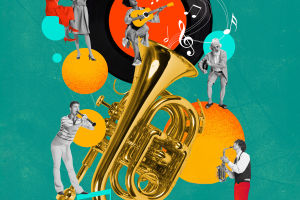Whether it's blasting through speakers at a party or flowing through our earbuds on a late-night walk, hip-hop has a way of connecting with us. But have we ever paused to think about how this once-underground culture grew into a global musical movement?
Today, we're diving into how hip-hop didn't just rise—it reshaped the music industry worldwide.
From the Bronx to the World
Back in the 1970s, hip-hop began as an outlet for young people in the Bronx, New York. They used beats, rhymes, and turntables to tell their stories. There wasn't a big budget or studio—just passion, community, and rhythm. DJs started looping breakbeats, while MCs added clever rhymes on top. That raw, real storytelling struck a chord. And from there, the fire spread.
We Watched It Evolve
In the beginning, hip-hop was mainly about self-expression, dance, and DJ contests. Over time, it began to touch on deeper themes—life in rough neighborhoods, social injustice, dreams, and identity. As technology advanced, the sound of hip-hop changed too—sampling, trap beats, autotune—all helped keep the genre fresh and always evolving.
Breaking Language and Border Barriers
One of the biggest shifts? Hip-hop went global. Now, we've got French rap, K-hip-hop, and African drill scenes all rising fast. This culture of rhythm and poetry translates across languages because the message—authenticity and resistance—is universal. We've seen artists like BTS's RM, France's Booba, and Nigeria's Blaqbonez blend their roots with the hip-hop vibe, creating something that's both local and global.
Influence on Mainstream Music Styles
It's not just that hip-hop is popular—it's that it has reshaped the way music is made. R&B, pop, even rock music have all absorbed elements from hip-hop. Listen to any Top 40 hit today, and chances are it includes a rap verse, trap drums, or a flow-driven hook. Major pop stars collaborate with hip-hop artists to stay relevant. That's how deeply rooted this genre has become in modern sound.
We See the Impact Beyond Music
Hip-hop's influence goes far beyond beats and lyrics. Fashion, language, advertising, and social movements have all picked up cues from hip-hop culture. Think of sneakers, streetwear, or phrases like "flex" or "no cap"—they all have roots in this culture. Hip-hop has also given young people, especially from underrepresented communities, a platform to express themselves creatively and claim space in global conversations.
Streaming Changed the Game
In the digital era, streaming platforms have played a huge role in helping hip-hop spread. Without needing radio play or label deals, artists can now release music on Spotify, YouTube, and TikTok—and become popular overnight. We've seen this with artists like Ice Spice or Central Cee, who built massive followings through viral content and direct fan interaction.
Criticism and Responsibility
Of course, hip-hop's global rise hasn't come without criticism. Some argue that it sometimes glorifies harmful behavior or lacks lyrical depth. But we've also seen many artists use their platform for good—raising awareness about mental health, inequality, and education. Just like any form of art, hip-hop reflects the world around it—and challenges us to think deeper.
So, What's Next for Hip-Hop?
We're now seeing hip-hop mix with AI-generated beats, virtual concerts, and social media storytelling. As the tools evolve, so does the culture. What won't change is its core: truth, rhythm, and the courage to speak up. Whether it's a freestyle on the street or a Grammy performance, the heart of hip-hop still beats with real stories.
Let's Keep Listening
If there's one thing hip-hop teaches us, it's that voices from the ground up matter. It's about sharing our truth, staying creative, and staying bold. So next time we vibe to a track, maybe we'll hear it with fresh ears—not just the beat, but the history, the people, and the movement behind it.
What's your favorite hip-hop moment or artist? Let's talk about it—drop a comment or share your playlist with us!


